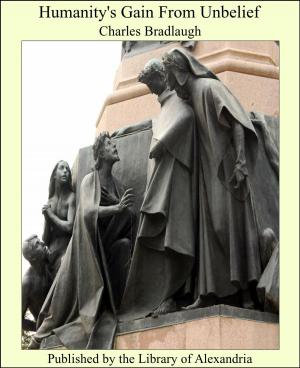Two Men: A Romance of Sussex
Nonfiction, Religion & Spirituality, New Age, History, Fiction & Literature| Author: | Alfred Ollivant | ISBN: | 9781465621801 |
| Publisher: | Library of Alexandria | Publication: | March 8, 2015 |
| Imprint: | Language: | English |
| Author: | Alfred Ollivant |
| ISBN: | 9781465621801 |
| Publisher: | Library of Alexandria |
| Publication: | March 8, 2015 |
| Imprint: | |
| Language: | English |
Old Beau-Nez shouldered out into the sea, immense, immovable, as when the North-men, tossing off him in their long-boats, had first named him a thousand years before. Like a lion asleep athwart the doors of light, his head massive upon his paws, his flanks smooth as marble, he rested. The sea broke petulantly and in vain against the boulders that strewed his feet. He lay squandered in the sunshine that filled the hollows in his back and declared the lines of his ribs gaunt beneath the pelt. Overhead larks poured down rivulets of song from the brimming bowl of heaven. The long-drawn swish of the sea, a sonorous under-current that came and went in rhythmical monotone, rose from the foot of the cliff to meet the silvery rain of sound and mingle with it in deep and mysterious harmony. It was May. The sides of the coombes were covered with cloth of gold: for the gorse was in glory, and filled the air with heavy fragrance; while the turf, sweet with thyme, was bejewelled with a myriad variety of tiny flowers. In earth and sea and sky there was a universal murmuring content, as though after labour, enduring for æons, the Mother of Time had at last brought forth her Son and, as she nursed him, crooned her thankfulness. Out of the West, along the back of the Downs, dipping and dancing to the curve of the land like the wake of a ship over a billowy sea, a rough road swept up to the head, passing a dew-pond, the old race-course still fenced in, and a farm amid stacks at the head of a long valley that curled away towards a lighthouse pricking up white against the blue on the summit of the cliff in the eye of the misty morning sun. The name of the lighthouse was Bel- or Baal-tout, reminding men by its title of the god their fathers worshipped on high places here and elsewhere throughout the world with human sacrifices—the god of the Philistine of every age and country, and not least our own. On Beau-nez itself a tall flagstaff overtopped a little cluster of white coast-guard stations, outside which a tethered goat grazed. Beside the flagstaff stood a man, watching a tan-sailed Thames barge leisurely flapping across the shining floor of water beneath. He too was massive: a big man with swarthy eyes set in a pale face, very sure of himself. So much you could tell by the carriage of his head, and the way he stood on his feet. He was not used to opposition, it was clear, and would not brook it; while the coat with the astrakhan collar he was wearing added to his air of consequence. Behind him in the road stood the dingy fly and moth-eaten horse that had brought him up the hill. The big man turned his back on the sun and walked slowly to the top of the steep coombe which overlooked the town that lay beneath him like a fairy city in the mists along the foam-lined edge of the bay, reaching out over the Levels to the East, and flinging its red-coated skirmishers up the lower slopes of the Downs.
Old Beau-Nez shouldered out into the sea, immense, immovable, as when the North-men, tossing off him in their long-boats, had first named him a thousand years before. Like a lion asleep athwart the doors of light, his head massive upon his paws, his flanks smooth as marble, he rested. The sea broke petulantly and in vain against the boulders that strewed his feet. He lay squandered in the sunshine that filled the hollows in his back and declared the lines of his ribs gaunt beneath the pelt. Overhead larks poured down rivulets of song from the brimming bowl of heaven. The long-drawn swish of the sea, a sonorous under-current that came and went in rhythmical monotone, rose from the foot of the cliff to meet the silvery rain of sound and mingle with it in deep and mysterious harmony. It was May. The sides of the coombes were covered with cloth of gold: for the gorse was in glory, and filled the air with heavy fragrance; while the turf, sweet with thyme, was bejewelled with a myriad variety of tiny flowers. In earth and sea and sky there was a universal murmuring content, as though after labour, enduring for æons, the Mother of Time had at last brought forth her Son and, as she nursed him, crooned her thankfulness. Out of the West, along the back of the Downs, dipping and dancing to the curve of the land like the wake of a ship over a billowy sea, a rough road swept up to the head, passing a dew-pond, the old race-course still fenced in, and a farm amid stacks at the head of a long valley that curled away towards a lighthouse pricking up white against the blue on the summit of the cliff in the eye of the misty morning sun. The name of the lighthouse was Bel- or Baal-tout, reminding men by its title of the god their fathers worshipped on high places here and elsewhere throughout the world with human sacrifices—the god of the Philistine of every age and country, and not least our own. On Beau-nez itself a tall flagstaff overtopped a little cluster of white coast-guard stations, outside which a tethered goat grazed. Beside the flagstaff stood a man, watching a tan-sailed Thames barge leisurely flapping across the shining floor of water beneath. He too was massive: a big man with swarthy eyes set in a pale face, very sure of himself. So much you could tell by the carriage of his head, and the way he stood on his feet. He was not used to opposition, it was clear, and would not brook it; while the coat with the astrakhan collar he was wearing added to his air of consequence. Behind him in the road stood the dingy fly and moth-eaten horse that had brought him up the hill. The big man turned his back on the sun and walked slowly to the top of the steep coombe which overlooked the town that lay beneath him like a fairy city in the mists along the foam-lined edge of the bay, reaching out over the Levels to the East, and flinging its red-coated skirmishers up the lower slopes of the Downs.















